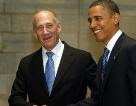
Tzvi Ben Gedalyahu
A7 News.
(IsraelNN.com) Former Prime Minister Ehud Olmert told an Australian newspaper that U.S. President Barack Obama was mistaken in trying to talk with Iran and in pushing for the building freeze on Jewish construction in eastern Jerusalem, Judea and Samaria. In a 90-minute interview with The Australian, the former Prime Minister said that there is no sense in trying to negotiate with Palestinian Authority Chairman Mahmoud Abbas unless he responds to Olmert’s previous offer for a new PA state.
Regarding President Obama and Iran, Olmert stated, "I was not happy with Obama's decision to have a dialogue with Iran. This dialogue will be used for only one purpose, to buy time for Iran. My advice would be to set a rigid timetable for this dialogue…. This is the responsibility of President Obama. The Americans want to lead the world, they must lead the world.”
Olmert commented that the new president is a friend of Israel but has followed the tracks of his predecessors in "knowing what is best” and reaching “almost peace.”
"I don't quite understand the American approach,” he told the newspaper. “Every new president believes they have to start from square one. If they're lucky they last for eight years, and by the end there is almost peace. But the new administration then starts anew, because they always know best.
"I think the tactic of starting to argue about a building here or there is a tactical mistake and I expect the Americans to change their approach."
PA State and Jerusalem
Olmert also revealed, perhaps for the first time, details of his talks with the PA for a new Arab state within Israel’s current borders and disclosed that he offered Abbas most of eastern Jerusalem as it capital, contrary to promises the former Prime Minister had made to the Shas party that he was not negotiating the future of the capital.
The two leaders met more than 35 times, often one-on-one, Olmert said. "On the 16th of September, 2008, I presented him with a comprehensive plan" based on four principles:
--Israel would surrender all of eastern Jerusalem, Judea and Samaria except for the suburbs of Jerusalem and large Jewish communities in Judea and Samaria. “All the lands that before 1967 were buffer zones between the two populations would have been split in half. In return there would be a swap of land …and contiguity of the Palestinian state …via] a tunnel fully controlled by the Palestinians but not under Palestinian sovereignty.”
--On Jerusalem, Olmert declared, “I was ready that the city should be shared. Jewish neighborhoods would be under Jewish sovereignty. Arab neighborhoods would be under Palestinian sovereignty, so it could be the capital of a Palestinian state…. I would never agree to an exclusive Muslim sovereignty over areas that are religiously important to Jews and Christians. So there would be an area of no sovereignty, which would be jointly administered by five nations, Saudi Arabia, Jordan, the Palestinian state, Israel and the United States.”
--Concerning Arab “refugees” who claim ancestry to former Arabs living in Israel, Olmert said, "I think Abu Mazen [Abbas] understood there was no chance Israel would become the homeland of the Palestinian people…. I told him I would never agree to a right of return. Instead, we would agree on a humanitarian basis to accept a certain number every year for five years, on the basis that this would be the end of conflict and the end of claims. I said to him 1,000 per year. I think the Americans were entirely with me.”
--Security: Olmert showed Abbas a map of a proposed PA state, a more or less final offer. Olmert maintained that Abbas said he would return the next day with his experts. "But the next day {negotiator) Saeb Erekat rang my adviser and said we forgot we are going to Amman today…. I never saw him again. To this day we should ask Abu Mazen to respond to this plan. If they say no, there's no point negotiating."
No comments:
Post a Comment